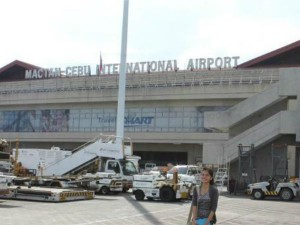DOTC relents on Mactan airport bidding

The Department of Transportation and Communications is expected to relax on Friday, Feb. 1, 2013, the restriction on companies with stakes in airlines from bidding for the Mactan-Cebu international airport project. PHOTO COURTESY OF FRANCES MANGOSING
The Department of Transportation and Communications (DOTC) is expected to relax the restriction on companies with stakes in airlines from bidding for the Mactan-Cebu international airport project.
Transportation Secretary Joseph Emilio Abaya said the DOTC’s bids and awards committee (BAC) would release on Friday updated terms of reference (TOR) for the airport contract.
“The BAC will meet and make the announcement and publication on Friday,” Abaya said when asked about the new TOR.
Earlier in the week, Abaya said the DOTC was studying the possibility of allowing companies with airline interests to participate as a minority in the P16-billion project.
The expected revisions followed appeals by San Miguel Corp. and JG Summit Holdings, two of the country’s biggest conglomerates, against the ban on groups with stakes in airlines from bidding for the project.
San Miguel Corp. owns a significant stake in and manages flag carrier Philippine Airlines (PAL) and sister firm AirPhil Express. JG Summit, on the other hand, owns Cebu Air Inc., operator of Cebu Pacific.
Apart from controlling PAL, San Miguel, through unit TransAire Development Holdings Corp., operates the Godofredo P. Ramos airport in Caticlan, the country’s gateway to tourist hotspot Boracay Island.
“Any entity providing air transport services in the Philippines, be they domestic or international, for the duration of the concession period, cannot be the facility operator; cannot have any interest, direct or indirect, in the project or the facility operator; or cannot be owned by the project SPC or the facility operator,” the original TOR read.
In previous interviews, DOTC’s Abaya said the exclusion of groups with stakes in airlines was aimed at minimizing all possible conflicts of interest that might arise from the situation of having a company providing services to its rivals.
“An airline/airport operator can make availability of slots, gates, counters, lounges and baggage handling more difficult for their competitors,” Abaya had said.
The existing Mactan-Cebu International Airport is the country’s second-biggest air passenger facility. In 2011, the airport handled more than 4.74 million domestic passengers and 1.47 million international travelers.
Passenger numbers grew at the facility at a compounded annual rate of 14.47 percent for domestic traffic and 11.02 percent for international traffic over the last five years.
Manuel V. Pangilinan’s Metro Pacific Investments Corp. and the Ayala Corp., in partnership with Cebu’s Aboitiz family, have expressed interest in the Mactan-Cebu airport project.
